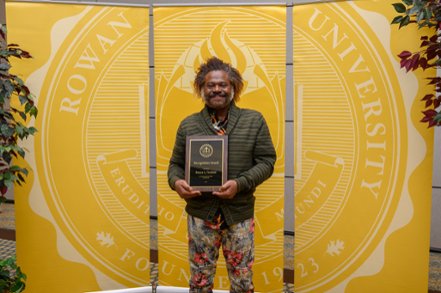“I value dissonance,” says Department of Theatre & Dance chair and faculty member Paule Turner, while knowing he has to navigate many twists & turns in his position. “Everything I do is a dance.”
During the 2020-2021 academic year, Turner was honored with the Inclusivity Award as part of the university’s annual Celebrating Excellence ceremony. The award - given for his work with groups such as Camden Sophisticated Sisters on projects including the 2019 production of GROOVE - recognized “an employee who promotes an inclusive workplace by inviting diverse viewpoints, encouraging collaboration, and modeling appreciation and respect toward colleagues.”

*Paule Turner holding the Inclusivity Award as part of the university’s annual Celebrating Excellence ceremony, with a yellow Rowan university logo in the background.
In this same year and at a time when issues of racial injustice dominate the nation’s social and political discourse, Turner has been reflecting even more fervently on his role as the first Black chair of the Department of Theatre & Dance at Rowan. “I’ve never put it out there,” Turner said of this distinction, after two years leading the department. “I am chair and I am a Black man. Why not celebrate that?”
Turner, who started as an adjunct at Rowan in 1998 before becoming a full-time faculty member in 2000, embraces his reputation for being provocative. His bio proclaims that his work as a choreographer is about "confronting politics full force" and he’s dedicated to creating a platform of freedom and expression. “I’ve found freedom in being a Black, gay performance artist,” he stated, understanding that this means he pushes the envelope and pushes buttons. He knows it makes an impact, though, whether it’s on audiences or people around him on a daily basis. “I find value in being seen fully and honestly as I bravely display my unique points of view on life and art,” he added.
He’s been on a mission when it comes to his life in academia too. In an era when heightened attention is being focused on inclusivity and representation, whether that be Hollywood or the professional theatre community or college campuses, the need to be driving a new conversation has been more urgent than ever for Turner.
As part of that effort, Turner encouraged the department to revise its academically-oriented mission statement last fall to be something more bold and direct. It now reads: “To transform society through artistic experiences that engage diverse communities, challenge habitual methods, and promote creative collaborations. Through our commitment to theatre and dance, we prepare evolving artists/scholars/citizens to express personal and universal stories as catalysts for change.”
“Those are some big words,” he declared. “These important words are designed to lead us in our decision- and policy-making and demand accountability towards accomplishing our goals of realizing a diverse, inclusive, and equitable future for our department and the world.”
He is also excited about implementing the department’s first Student Advisory Board with faculty advisor Dawn Marie Bazemore, to elevate the voices of that constituency. “If my tenure as chair is to lead us in transforming society I must believe, just as the great philosopher and New Jersey native Whitney Houston crooned, ‘the children are the future’ and therefore we must ‘teach them well and let them lead the way.’”
It’s similar to a message he delivers in class too, telling his students “I want to see all of you and your culture in this dance. Don’t wait for someone else to tell your story.”